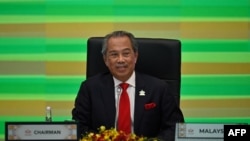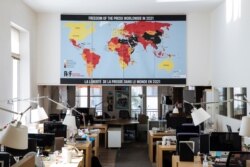For the past few years Malaysia had been making great strides in press freedom. Under its first democratically elected government for decades, repressive laws were repealed, giving the country’s media more space to do their job.
But the unexpected resignation by Prime Minister Mathathir Mohamad last year triggered the collapse of the coalition government, and the king named a new prime minister, without holding elections.
Since the new leader, Muhyiddin Yassin, was sworn in on March 1, 2020, press freedom has come under attack, with the government relying on pre-existing laws, and a new “anti-fake news” decree targeting journalists, media experts say.
These measures introduced during the pandemic, along with cases of journalists being questioned or raided by police over their coverage, led to an 18-point decline for Malaysia on the annual World Press Freedom Index. Released by media watchdog Reporters Without Borders (RSF), the index ranked Malaysia 119 out of 180 countries, with 1 being the most free.
“For two years Malaysia was the highest rise in the Press Freedom Index,” Daniel Bastard, head of the Asia-Pacific Desk at RSF, told VOA, adding that the political shift had brought a big change for the country’s media.
The former ruling party’s return to power had an immediate impact, Bastard said, adding, “Self-censorship is clearly back.”
The government has relied on harsh laws that media analysts say target journalists and restrict access to information. These include the Official Secrets Act, Communications and Multimedia Act, and Sedition Act. The latter carries a maximum 20-year jail sentence.
For journalists, navigating the laws is a continuous challenge.
“There's too much government control,” Farah Marshita Abdul Patah, president of National Union of Journalists Peninsular Malaysia (NUJM), told VOA. “There's too many laws that we need to abide to.”
The laws prevent media from getting important information out to the public, Patah said.
This was seen during the pandemic when authorities attempted to control press coverage.
COVID measures were used as the pretext to block media access to some press conferences and government events, Alyaa Alhadjri, of Gerakan Media Merdeka (GeramM), a press freedom coalition in Malaysia and South East Asia, told VOA.
For the most part, she said, only state-owned media and national broadcasters were allowed to attend briefings.
Others faced legal action over reporting.
Tashny Sukumaran, a correspondent with the South China Morning Post, was questioned by police over coverage in May on the arrests of migrant workers as part of a COVID-19 crackdown in Kuala Lumpar.
And in August, police raided the Kuala Lumpur offices of broadcaster Al Jazeera and confiscated computers in connection to a documentary on the arrests of migrant workers.
Two Australian journalists at the broadcaster were told their work visas would not be renewed and seven in total face possible charges of sedition, defamation and violation of the Communications and Multimedia Act, according to RSF.
Police also arrested a Bangladeshi migrant worker featured in the documentary.
“All of these events definitely over the past year, they generally don't make it very easy for us journalists who operate in Malaysia,” said Patrick Lee, president of Foreign Correspondents Club of Malaysia (FCCM) and a correspondent with Agence France-Presse (AFP).
After Sukumaran was summoned, many news outlets held back from covering the threats to migrant workers, said Bastard of RSF.
“In 2020, harassment and self-censorship was mainly related to the authorities' response to the COVID-19 crisis, and more specifically the fate of migrant workers,” Bastard told VOA.
Malaysia's Ministry of Communications and Multimedia did not respond to VOA's email.
False news law
The biggest concern, media and analysts say, is a new “anti-fake news” law passed under emergency powers in March 2021, as part of the government’s effort to combat misinformation about the COVID-19 pandemic.
The decree is similar to a 2018 law that was widely criticized by human rights and press freedom groups, and eventually repealed under former Prime Minister Mahathir Mohamad’s government.
Those convicted of spreading “fake news” face a fine of 100,000 ringgit (USD $24,000), up to three years in prison, or both. Repeat offenders face a daily fine of up to 1,000 ringgit (USD $243).
“Usually laws such as these need to be drafted in parliament and passed after a lengthy debate,” said Lee, of the FCCM. “But because our country is currently under emergency law right now, there is no parliamentary approval needed to pass these laws.”
Critics have pointed to the loosely defined law as problematic.
“It's ambiguous,” Patah told VOA. “There is no clear definition of what is fake news, so basically, it's open to interpretation.”
Bastard said the decree “clearly allows the government to give its own version of truth.”
The law is part of a larger pattern that RSF has seen throughout the region during the pandemic.
“COVID is a pretext, of course,” Bastard said. “In Southeast Asia we have witnessed a lot of cases of countries who passed some very harsh laws restricting press freedom and freedom of information.”
Cambodia, the Philippines, Indonesia, and Thailand are among countries that used the pandemic as a pretext to curtail press freedom, Bastard said.
For Malaysia to avert any further decline, the government needs to repeal laws that target journalists and ensure that the press is given respect and access to information, Bastard said.
“I think that's something that needs to be done, that puts Malaysia into another era, and puts it on tracks of true democracy."
Change is also needed to improve access to information and public perception of the media, Patah said.
“There needs to be trust in the media,” she said. “In order for us to gain the trust from the public, we need to be seen as a media that is free.”
Nabila Ganinda contributed to this report.






